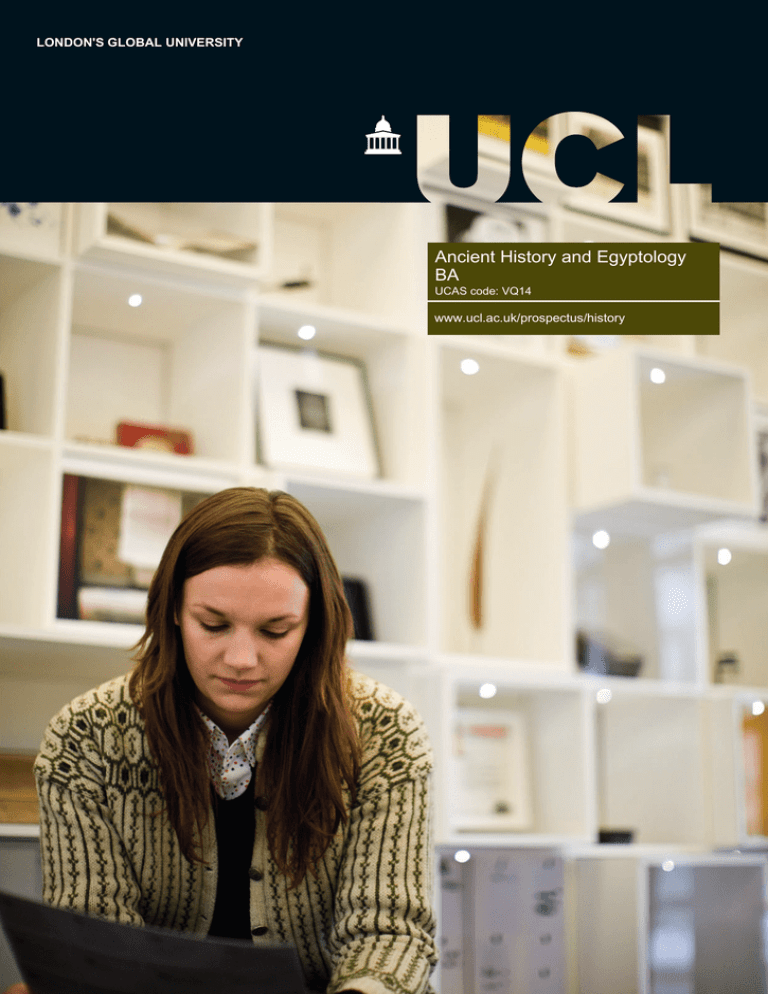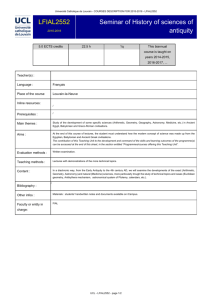Ancient History and Egyptology BA LONDON'S GLOBAL UNIVERSITY www.ucl.ac.uk/prospectus/history
advertisement

LONDON'S GLOBAL UNIVERSITY Ancient History and Egyptology BA UCAS code: VQ14 www.ucl.ac.uk/prospectus/history Ancient History and Egyptology BA This three-year specialist degree enables you to study the history, culture and language of ancient Egypt in the wider framework of the history of the Mediterranean and Middle Eastern world from the early third millennium to the end of the first millennium BC. Degree summary • UCL is uniquely equipped to offer this degree, since a first-class Egyptology library and an important study collection of Egyptian antiquities (the Petrie Museum of Egyptian Archaeology) are housed here. • The programme invites you to approach Egypt in three distinct ways: as an historian, as an archaeologist (through its material culture) and as a philologist (through its language). • Drawing upon UCL History, related UCL departments and relevant University of London colleges, the programme offers a wide variety of options and an unrivalled range of ancient language courses. • Exceptional resources, including the British Museum and British Library, are within walking distance, and other London-based museums and organisations provide unrivalled opportunities for accessing primary source material. The programme includes six compulsory first-year courses, a research project of 5,000 words in the second year, a final-year dissertation and options chosen from a range of full-year and half-year courses. All students learn the Egyptian language, hieroglyphic and demotic scripts, and the history of the peoples living on the banks of the Nile, the Euphrates and the Tigris, as well as their neighbours in Nubia, Anatolia and Iran. When choosing optional courses in the second and third year, you can focus on languages, ancient history and/or archaeology. The range of ancient languages available at UCL and related University of London colleges is unrivalled anywhere in the UK. You can, for example, learn Ancient Hebrew in UCL Hebrew & Jewish Studies or Akkadian, Sumerian or Hittite at the School of Oriental and African Studies (SOAS). Your learning Many of our courses include lectures, but our approach to learning mainly places emphasis on active student participation in seminar discussion (usually in groups of 15). Essays you write will be returned to you in individual face-to-face tutorials to provide constructive, personal feedback. Your work will be assessed by a mixture of examinations and written coursework. Significant weight is given to an extended essay based on original sources produced in your final year. Your career The programme is designed to teach many transferable skills: how to gather and organise evidence; how to analyse it and present a structured argument; how to express yourself clearly, both in writing and orally. UCL's History graduates have excelled in a wide range of occupations, as lawyers, financial advisers, stockbrokers, television producers, diplomats, journalists, bankers, teachers, museum curators, and in the health service, the police and overseas development programmes, as well as in progressing to further study. First destinations of recent graduates (2010-2013) of this programme include: • • • Full-time student, MA in Egyptology at the University of Oxford Intern, Dorset County Museum Full-time student, MA in Ancient History at UCL Degree structure In each year of your degree you will take a number of individual courses, normally valued at 0.5 or 1.0 credits, adding up to a total of 4.0 credits for the year. Courses are assessed in the academic year in which they are taken. The balance of compulsory and optional courses varies from programme to programme and year to year. A 1.0 credit is considered equivalent to 15 credits in the European Credit Transfer System (ECTS). Year One Compulsory courses Concepts, Categories and the Practice of History Introduction to Ancient Egyptian Language Introduction to Egyptian and Near Eastern Archaeology Late Egyptian Language and Texts Texts in Archaeology Writing History Optional courses Either: The Near East to 1200 BC: The Earliest States or The Near East, 1200-336 BC Year Two Compulsory courses Archaeology of Ancient Egypt Research Seminar (5,000-word Research Project) A further Egyptian language course Optional courses Either: The Near East to 1200 BC: The Earliest States or The Near East, 1200-336 BC. Plus a further 1.0 credit from a wide range of optional courses in ancient history, ancient languages, egyptology, history or from another approved interdepartmental programme. You must have taken courses to a minimum of 4.0 credits in Egyptology and 4.0 credits in ancient history (or an approved related discipline) by the end of your degree programme. Final Year Compulsory courses Dissertation Optional courses You will select 3.0 credits from a wide range of optional courses in ancient history, ancient languages, archaeology, Egyptology, history or from another approved interdepartmental programme. You must have taken courses to a minimum of 4.0 credits in Egyptology and 4.0 credits in ancient history (or an approved related discipline) by the end of your degree programme. Entry requirements A levels Promising applicants will be asked to supply further information to help us in determining whether to offer a place. Fees A level grades A*AA-AAA UK/EU fee £9,000 (2016/17) A level subjects History, Ancient History or Classical Civilisation required. Overseas fee £16,130 (2016/17) AS levels For UK-based students a pass in a further subject at AS level or equivalent is required. Notes Details about financial support are available at: www.ucl.ac.uk/study/ug-finance GCSE English Language and Mathematics at grade C; Ancient European Language at grade B also welcomed. For UK-based students a foreign language at grade B is required. IB diploma IB points 38-39 Subjects A score of 18-19 points in three higher level subjects including grade 6 in History, with no score lower than 5. A minimum of 5 is required at standard level in a modern or ancient European language. Contacts Contact Undergraduate Programmes and Admissions Assistant Email christopher.allen.14@ucl.ac.uk Telephone +44 (0)20 7679 7125 Prospectus entry www.ucl.ac.uk/prospectus/history Key facts REF 82% rated 4* (‘world-leading’) or 3* (‘internationally excellent’) Department History Faculty Social & Historical Sciences Other qualifications Full lists of all degree programmes and other entry requirements can be found on our website at: www.ucl.ac.uk/otherquals Undergraduate Preparatory Certificates UCL's Undergraduate Preparatory Certificates (UPCs) are intensive one-year foundation courses for international students of high academic potential, who are aiming to gain access to undergraduate degree programmes at UCL and other top UK universities. For more information see our website: www.ucl.ac.uk/upc Your application Application for admission should be made through UCAS (the Universities and Colleges Admissions Service). Applicants currently at school or college will be provided with advice on the process; however, applicants who have left school or who are based outside the United Kingdom may obtain information directly from UCAS. Each candidate's profile is considered as a complete picture, taking into account your interest in and suitability for the degree, as shown in your personal statement and referee's report, as well as achieved and predicted grades. Your ability to present an argument, evidence of intellectual curiosity and your enthusiasm for and commitment to studying history will also be assessed. PDF Updated: February 19, 2016 Information correct at time of going to press. See website (www.ucl.ac.uk/prospectus/history) for latest information Mr Chris Allen



